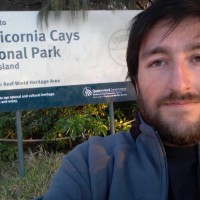Francisco Vidal Ramirez
PhD candidate
University of Queensland
francisco.vidalramirez@uq.net.au

From 2005 to 2022, the main node of the ARC Centre of Excellence for Coral Reef Studies was headquartered at James Cook University in Townsville, Queensland (Australia)








Francisco is from Chile, where he obtained his degree of Marine Biologist at the University of Valparaiso after the completion of a thesis focused on cytogenetics of rocky shore mussels. Immediately after this, he obtained a position for 4 years at the coastal station for marine research (ECIM) from the Pontifical Catholic University of Chile, where he was involved in research that was focused on ecology, photobiology, thermal tolerance, climate change impact and fisheries of marine invertebrates, working along with interdisciplinary groups at the international laboratory of climate change (LINCGlobal) and the Mediterranean institute of advance studies (IMEDEA) in Mallorca, Spain. Ended this period, Francisco moved to Australia to join the Coral Reef Ecosystems Laboratory (CRE Lab) at the University of Queensland where he is currently undertaking his PhD under the supervision of A/Professor Sophie Dove, A/Professor Gene Tyson and Dr. Maria Byrne from the University of Sydney. His PhD project assesses the effects of different ocean warming and ocean acidification scenarios on the performance of sea cucumbers in different processes such as calcium carboate dissolution, recycling of nutrients and the interaction between these invertebrates and different communities present in the sediments they process.
New DNA techniques are being used to understand how coral reacted to the end of the last ice age in order to better predict how they will cope with current changes to the climate. James Cook Univer
A new study on the effects of climate change in five tropical countries has found fisheries are in more trouble than agriculture, and poor people are in the most danger. Distinguished Profess
James Cook University researchers have found brightly coloured fish are becoming increasingly rare as coral declines, with the phenomenon likely to get worse in the future. Christopher Hemingson, a
Researchers working with stakeholders in the Great Barrier Reef region have come up with ideas on how groups responsible for looking after the reef can operate more effectively when the next bleaching
Abstract: As marine species adapt to climate change, their heat tolerance will likely be under strong selection. Individual variation in heat tolerance and its heritability underpin the potential fo
Abstract: The Reef Ecology Lab in KAUST’s Red Sea Research Center explores many aspects of movement ecology of marine organisms, ranging from adult migrations to intergenerational larval dispersal
Abstract: Macroalgal meadows are a prominent, yet often maligned component of the tropical seascape. Our work at Ningaloo reef in WA demonstrate that canopy forming macroalgae provide habitat for ad
Abstract: Sharks are generally perceived as strong and fearsome animals. With fossils dating back at least 420 million years, sharks are not only majestic top predators but they also outlived dinosa
Abstract: Connectivity plays a vital role in many ecosystems through its effects on fundamental ecological and evolutionary processes. Its consequences for populations and metapopulations have been
Abstract: Evolution of many eukaryotic organisms is affected by interactions with microbes. Microbial symbioses can ultimately reflect host’s diet, habitat range, and even body shape. However, how
Abstract: The past few years have seen unprecedented coral bleaching and mortality on the Great Barrier Reef (GBR) but the consequences of this on biodiversity are not yet known. This talk will expl